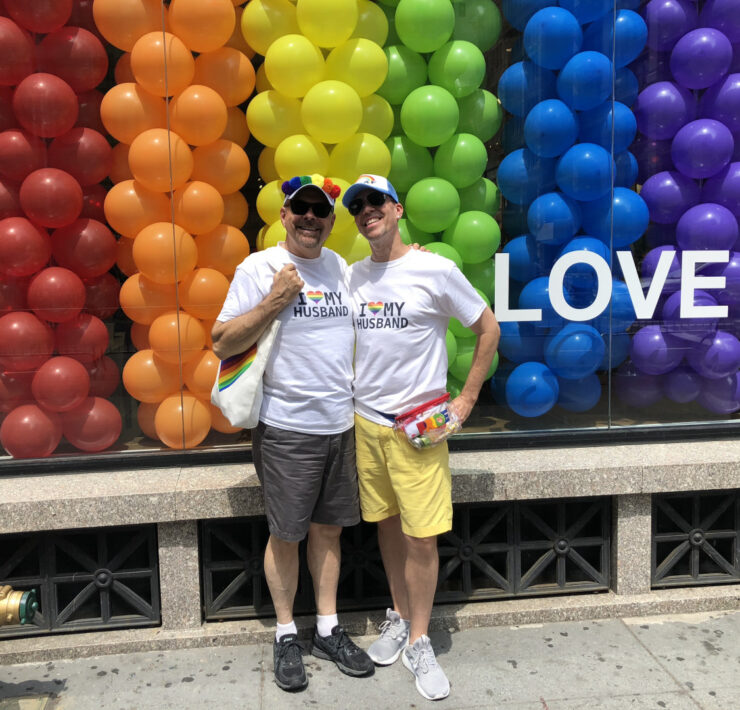What the Hell is love?

Valentine’s day can feel like a test to see if you are winning at life or losing, depending on if you are in love, with whom, and how you express that love on this particular day. But who makes the rules? What is the prize? For us queer folks, Valentine’s Day can activate internalized homo-bi-transphobia, highlight unconscious heteronormative expectations of love and relationships, and set our self-esteem into a tailspin.
Valentine’s day is a weird cultural barometer, and as a therapist, I honestly have no idea what you mean when you say,” I’m in love.” We have this word that we think everyone shares in its definition, but it is uniquely different for everyone. This Valentine’s Day, ask yourself: What the hell is love?
Let’s Diversify Love.
Rather than trying to define love, what if you develop curiosity and questions about what it could be? Valentine’s Day amplifies a notion of love informed by romantic comedies, religion, heteronormativity, and monogamy. It is an extremely narrow subset of all kinds of love, especially in LGBTQ communities. Subscribing to this one type of love is harmful, as it perpetuates homo-bi-transphobia and queer erasure.
Is Marriage Love?
When we think of romantic love, we often think of a bond between two people. We are raised and socialized to believe the end goal of that bond is monogamous marriage. Janet W. Hardy and Dossie Easton describe the historical context of traditional marriage through a polyamorous and sex-positive lens in their book, Ethical Slut.
They share, “…. Our beliefs about traditional marriage date from agrarian cultures, where you made everything you ate or wore or used, or large extended families helped get this huge amount of work done so nobody starved, and where marriage was a working proposition. When we talk about ‘traditional family values,’ this is the family we are talking about, an extended family of grandparents and aunts and cousins, an organization structured to accomplish the work of staying alive.” Yet, our survival no longer depends on monogamous marriage. What is the deal with monogamy? Why is monogamous marriage the rubric for relationship success?
Nonmonogamous Love
Author and therapist Jessica Fern’s book Polysecure outlines how healthy polyamory is created through secure attachment based on John Bowlby’s attachment theory. Ferns’s body of work examines how expansive our love can be, yet a practical consideration must be utilized to respect all partners involved. Fern states: “In the non-monogamous world, there is a popular saying that love is infinite, but time and resources are not. This saying highlights the paradox of ultimate versus relative reality—Love is not a finite resource, so it is possible for us to love more than one person at a time, but we are all in bodies that are limited to the relative realities of space and time, so having infinite partners is not actually possible.”
Fern’s approach provides a sustainable and realistic conceptualization for logistically loving multiple people. Considering our endless capacity to love, does all love need to grow into long-term sexual relationships? Is love validated in sex, marriage, or relationship status? What about the value of varying levels of love?
What about Platonic Love?
Platonic love, including physically intimate yet non-sexual love, is incredibly profound in LGBTQ culture. Many subsets of queer communities are lucky to include forms of emotional and physical affection and intimacy that do not lead to sex or relationships, yet validate our friendships and found family membership. However, often, there is untracked internalized heteronormativity in our communities that doesn’t allow us to acknowledge the significance and impact of these platonic relationships and platonic love.
Heteronormativity tells us who is a friend, family, loved one, or intimate partner. Those lines are not and don’t need to be as distinct in queer culture. An aspect of our queer strength comes from our interconnection based on the shared experience of oppression. We queer folks are lucky to find love, including platonic love outside of traditional definitions. Similarly, we’re able to find love in unconventional contexts.
Providing Stability is Loving
Circling back to marriage, “When we think of traditional love, and traditional marriage, the core of that is stability. Stability of home, stability of income, and stability of safety. During the 11th Century, marriage was about securing an economic or political advantage.”
This consideration raises the question of love within sex work and the stigmatization of sex work. How about finding love in sex work? What about a sex worker and a client falling in love? What about financial security as a form of love? Sex work provides stability of income, and financial safety, for which sex workers can provide basic needs like housing. Even if a loving bond isn’t created within a sex work relationship, it can still be loving. Providing financial stability, sexual pleasure, mutuality, and mutual benefit are components of love.
Loving Sexual Surrogacy
Sexual surrogacy is a form of sex work that, in some countries, is covered by insurance. Sexual surrogacy is provided to people with disabilities who cannot engage autonomously in sex, masturbation, or pleasure. It is incredibly loving in that it gives equitable sexual experiences to those living with disabilities. Sexual surrogates are knowledgeable of their client’s health presentations, develop a client-centered relationship, and create a holistic understanding of the sexual needs of their clients. Sexual surrogacy is healing for clients on a somatic-emotional level that parallels the psyche-emotional healing within psychotherapy, though the boundaries are very different.
Self-Love
Speaking of therapy, what about self-love through self-compassion? Self-compassion alone is a profound form of love and the number-one goal of my therapy practice. As LGBTQ folks, we must deal with many incongruences of pride and shame and all the disparate messages we have internalized that influence how we feel about ourselves. Heteronormativity is pervasive in media and the images we ingest moving through the world. Yet, we are often not visible in those images, influencing our internalized shame for whom we are attracted and the community in which we are affirmed. LGBTQ+ Specialized Therapy can help queer folks find a holistic balance of the sum of all our parts, and that is a loving act.
Loving All Our Parts
Psychologist Richard C. Schwartz, PhD. founded Internal Family Systems, an approach to psychology as naturally comprised of many different parts which narrate our inner processes. Each part reflects our past that attempts to help us navigate our life. Some parts can be a saboteur, an antagonist, and an inner bully. These characters are well intended even when they perpetuate pain, inner criticism, or shame, reflecting internalized oppression, abuse, and trauma.
“Internal family systems operate from the radically different assumption that each part—no matter how demonic seeming—has a secret, painful history to share of how it was forced into its role and come to carry burdens it doesn’t like that continues to drive it.” With self-compassion and empathy, clients can identify how they are a sum of all their parts, including those causing pain and pride. Through listening to our parts, there is an honoring within ourselves that cultivate inner harmony.
How Do you Love?
So, what the hell is love? Honestly, no one can tell you precisely what love means for you. Working with the vast diversity of my client base, I have explored and clarified the concept of love with each client as it is defined in their relationships, including relationships with themselves. Clinical exploration of what love is points to the importance of compassion, curiosity, and diversity in how we experience love: platonic, sexual, romantic, transactional, and on a community level. As queer folks, we can self-identify and define our lives in various ways outside of heteronormativity, including how we experience love.
This Valentine’s Day, take a moment and ask yourself, how are you engaging in love?
For more on this topic, visit @ Holisitic.Homosexual.










